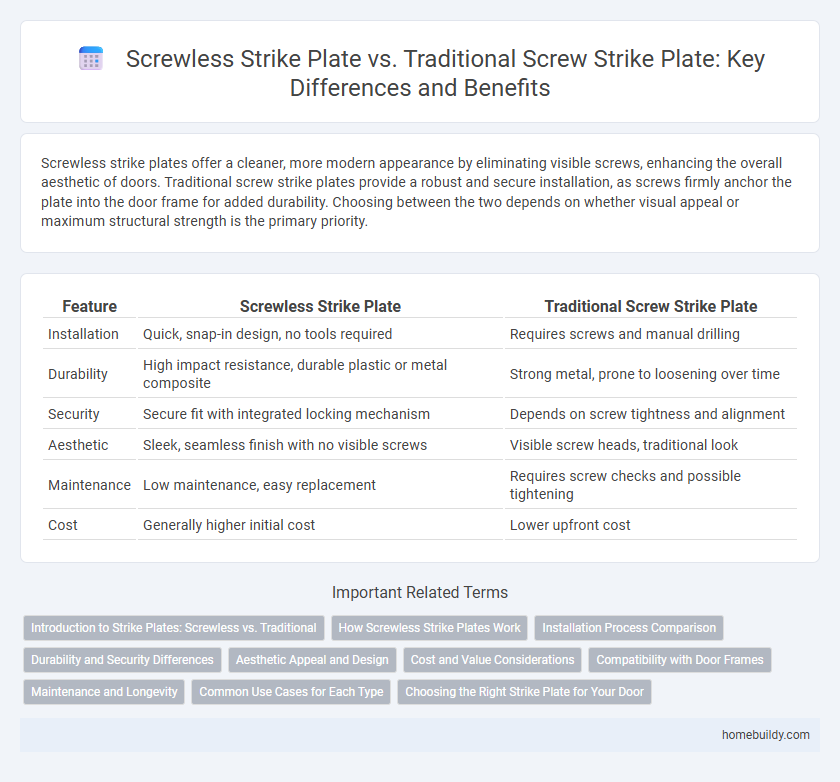Screwless strike plates offer a cleaner, more modern appearance by eliminating visible screws, enhancing the overall aesthetic of doors. Traditional screw strike plates provide a robust and secure installation, as screws firmly anchor the plate into the door frame for added durability. Choosing between the two depends on whether visual appeal or maximum structural strength is the primary priority.
Table of Comparison
| Feature | Screwless Strike Plate | Traditional Screw Strike Plate |
|---|---|---|
| Installation | Quick, snap-in design, no tools required | Requires screws and manual drilling |
| Durability | High impact resistance, durable plastic or metal composite | Strong metal, prone to loosening over time |
| Security | Secure fit with integrated locking mechanism | Depends on screw tightness and alignment |
| Aesthetic | Sleek, seamless finish with no visible screws | Visible screw heads, traditional look |
| Maintenance | Low maintenance, easy replacement | Requires screw checks and possible tightening |
| Cost | Generally higher initial cost | Lower upfront cost |
Introduction to Strike Plates: Screwless vs. Traditional
Screwless strike plates offer a sleek, modern design that eliminates visible screws for enhanced aesthetic appeal and ease of installation. Traditional screw strike plates rely on exposed screws that provide strong mechanical fastening and allow for straightforward replacement or adjustment. Both types serve critical roles in reinforcing door frames and securing locks, with screwless models favoring a cleaner look and traditional plates ensuring durable attachment.
How Screwless Strike Plates Work
Screwless strike plates use tension-based locking mechanisms that secure the plate to the door frame without visible screws, relying on built-in clamps or spring-loaded clips for a seamless installation. This design allows for quick, tool-free installation while maintaining strong resistance against forced entry by evenly distributing pressure along the door frame. Unlike traditional screw strike plates that require precise screw placement, screwless options enhance both aesthetic appeal and security through their innovative fastening system.
Installation Process Comparison
Screwless strike plates simplify the installation process by snapping into place without the need for pre-drilled holes or screw alignment, significantly reducing installation time and effort. Traditional screw strike plates require precise measurements and manual screwing to secure them, often involving pilot holes and alignment adjustments to ensure proper fit. The screwless design offers a cleaner aesthetic and quicker retrofit option, making it ideal for both DIYers and professionals seeking efficiency.
Durability and Security Differences
Screwless strike plates offer enhanced durability through friction-based installation that reduces material fatigue caused by screw holes, unlike traditional screw strike plates which may weaken over time due to repeated screw stress. Security-wise, screwless models minimize tampering risks by eliminating visible screws, making forced entry more difficult compared to conventional plates reliant on exposed screws. The absence of screw holes also maintains structural integrity, providing longer-lasting resistance against forced impacts and ensuring consistent door frame reinforcement.
Aesthetic Appeal and Design
Screwless strike plates offer a sleek, minimalist design that enhances the door's aesthetic appeal by eliminating visible screws, creating a clean and modern look. Traditional screw strike plates, with their exposed screws, provide a more utilitarian appearance that can disrupt the door frame's visual flow. The seamless integration of screwless strike plates makes them ideal for contemporary interiors seeking an unobtrusive and polished finish.
Cost and Value Considerations
Screwless strike plates typically cost more upfront than traditional screw strike plates but offer enhanced aesthetic value by providing a cleaner, more modern appearance without visible screws. Traditional screw strike plates are more affordable and easier to install, making them a cost-effective option for basic security needs. Evaluating long-term durability and maintenance costs can help determine the best value between these two types of strike plates.
Compatibility with Door Frames
Screwless strike plates offer enhanced compatibility with various door frames by eliminating pre-drilled screw holes, allowing for a more flexible installation that adapts to frame irregularities. Traditional screw strike plates require precise alignment with existing screw holes, which can limit their use on older or non-standard door frames. The screwless design reduces damage to door frames and maintains structural integrity, making it ideal for retrofitting or modern frames lacking standardized mounting points.
Maintenance and Longevity
Screwless strike plates offer easier maintenance by eliminating loose or missing screws, reducing the need for frequent adjustments and repairs compared to traditional screw strike plates. Traditional screw strike plates can become misaligned over time due to screw loosening, leading to wear and decreased security. The screwless design enhances longevity by maintaining consistent alignment and minimizing hardware degradation under regular use.
Common Use Cases for Each Type
Screwless strike plates are commonly used in modern commercial buildings and high-end residential properties where aesthetics and quick installation are priorities. Traditional screw strike plates are preferred in heavy-duty applications such as exterior doors and security-sensitive areas due to their enhanced durability and secure fastening. Each type is selected based on the balance between appearance, security needs, and installation requirements.
Choosing the Right Strike Plate for Your Door
Screwless strike plates offer a sleek, modern look with easy installation, eliminating visible screws and enhancing door aesthetics. Traditional screw strike plates provide robust security, fastening firmly into the door frame to prevent forced entry and withstand heavy use. Selecting the right strike plate depends on balancing design preferences with security needs, ensuring durable hardware that complements your door style.
screwless strike plate vs traditional screw strike plate Infographic

 homebuildy.com
homebuildy.com